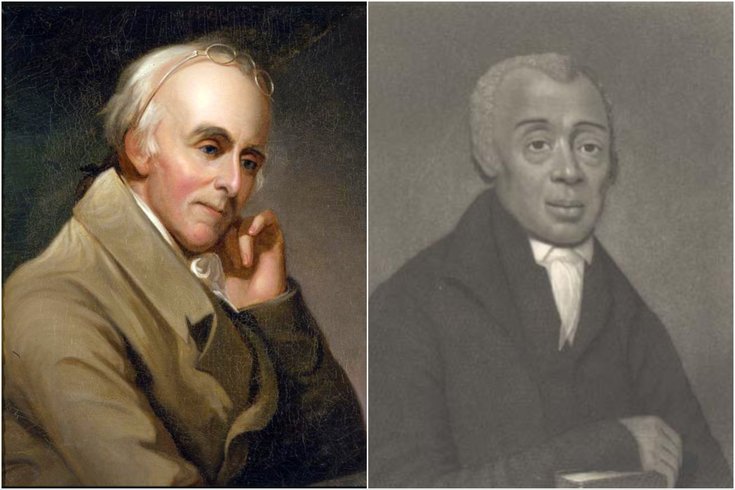
February 26, 2024
 Public domain/Wikicommons
Public domain/Wikicommons
A new Science History Institute series will discuss how Benjamin Rush (left) spread a false message to free Black community leaders like Richard Allen (right) to enlist their help in fighting the yellow fever epidemic of 1793 in Philadelphia.
In the summer of 1793, mosquitoes carrying yellow fever descended upon Philadelphia, sparking the worst outbreak of the disease in North America. Those that could afford to skip town fled as the virus spread from the port to other pockets of the city, ravaging the poorest neighborhoods.
By November, nearly 10% of residents were dead.
Benjamin Rush, a Founding Father and widely respected physician, believed he had a solution. The city's free Black population should care for the sick since, Rush reasoned, they were immune to the illness. Local Black preachers Richard Allen and Absalom Jones spread his message to their congregants, who volunteered to nurse the afflicted back to health or, in grimmer situations, dig their graves.
But Rush was wrong, and his mistake would cost lives. Black Philadelphians were just as susceptible to yellow fever as their white peers. His theory wasn't rooted in biology; it was a racist assumption.
A new free online course series at the Science History Institute seeks to illuminate those assumptions, exploring how they took root and persisted over centuries. "How Science Invented the Myth of Race" will begin its first one-hour session Tuesday at 6 p.m. with a 101 introduction to scientific racism.
"The way we talk about science, the way we elevate it, is really this idea of if there's cold logic, there's no human anything involved in it," said Alexis Pedrick, director of digital engagement for the Science History Institute. "It happens in a lab space, in a box where there's nothing involved.
"If you work in science and you do that work, you fundamentally know that's not true."
The courses are an extension of Pedrick's "Innate" series for the institute's "Distillations" podcast and magazine. That project launched in 2023 after years of development and struggle to raise funding. A $359,097 grant from the National Endowment for the Humanities, awarded in 2021, helped set the work in motion.
Once Pedrick and her colleagues hit the books, they were unsettled by how inseparable the history of science was from racism. Their first episode discusses an encyclopedia from 1493, which contains illustrations of "strange people" around the world with large ears, enormous "umbrella" feet and animal features.
"We kind of thought this would be a really straightforward question, like racism and science: Where did it start?" she said. "We'll go to the 1800s, it'll be in the books. Bam: racism starts there in science, and it'll be a direct route. Then the more we dug and the more people we talked to and the more scholars we worked with, and the more reading we did, the more it was like, oh, okay, this is in the water. This is part of the foundation. Science has this built into it. And that really just spurred us forward."
Like the podcast, the course series will explore local history like the yellow fever epidemic of 1793 and well-known stories from outside Philadelphia, including the U.S. Public Health Service syphilis study at Tuskegee. The classes, however, will delve deeper into these subjects with updates where relevant. One topic is the repatriation of human remains, which encompasses the controversies at the Penn Museum over its handling of the bones of MOVE bombing victims and Black Philadelphians in the Morton Cranial Collection. Enrolled students will also be able to ask questions during the live courses.
"I think it will be exciting to include those updates mainly because I think it reminds people that this is something that is happening now in our society, in our lives, at this moment," Pedrick said. "It's not all things that happened a long time ago that we're past. I think that that adds some urgency to wanting to make sense of all this."
Classes will be held once a month, with the fifth and final session falling in June. While the courses are free, registration is required to join.
"Science is ever-evolving, and in its best-case scenario, self-correcting," Pedrick said. "If you're not learning, you are not growing at all."
Follow Kristin & PhillyVoice on Twitter: @kristin_hunt
| @thePhillyVoice
Like us on Facebook: PhillyVoice
Have a news tip? Let us know.